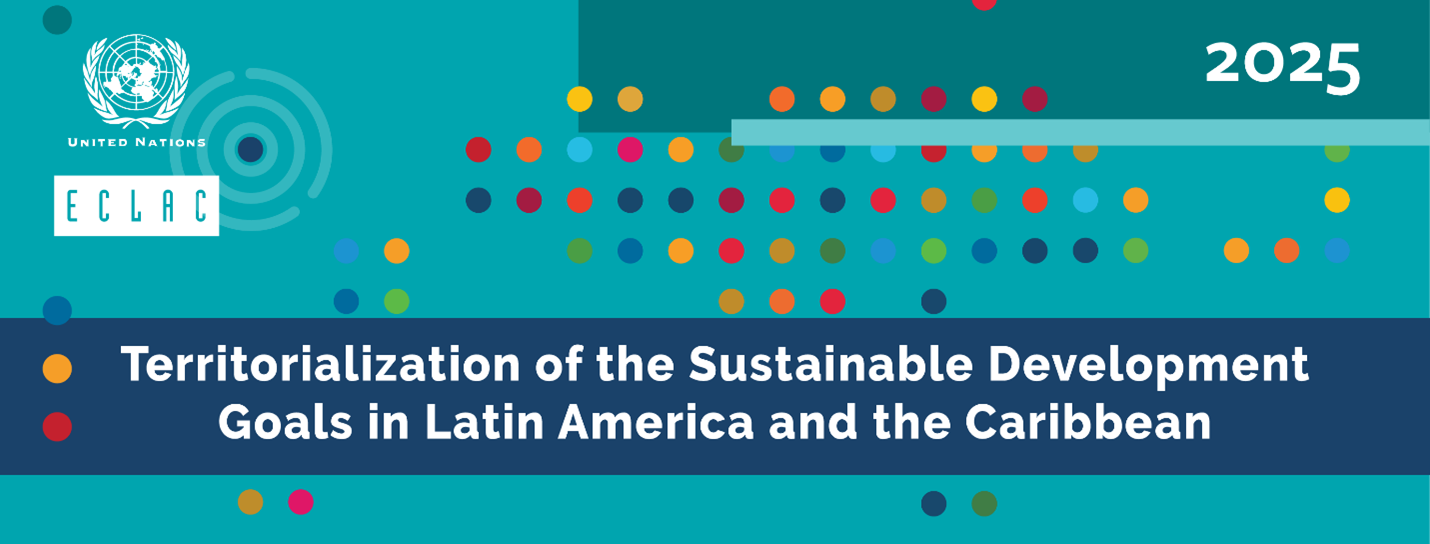Territorialization of the Sustainable Development Goals in Latin America and the Caribbean
Work area(s)
Latin American and Caribbean Institute for Economic and Social Planning (ILPES) of the Economic Commission for Latin America and the Caribbean (ECLAC)
Course information

Type of course
Training method
Course language
Geographic scope
Date
21 Jul - 31 Dec 2025, All dayDate of registration
21 Jul - 01 Dec 2025Status
Financing type
Financing
Target audience
COURSE OBJECTIVES
a. To guide the development of Voluntary Local Reviews (VLR) using basic guidelines that are globally agreed upon and adapted to the regional context.
b. To support subnational governments in the territorialization of the 2030 Agenda, drawing from practices in the region and around the world.
c. To disseminate lessons learned in the implementation of VLR in Latin America and the Caribbean.
BACKGROUND
The 2030 Agenda for Sustainable Development, adopted in 2015 by UN Member States, sets forth "a shared blueprint for peace and prosperity for people and the planet, now and into the future." It establishes 17 Sustainable Development Goals (SDGs) that address the environmental, social, and economic dimensions in an integrated manner, recognizing the interdependence among these spheres. This framework promotes an inclusive and transformative approach to eradicating poverty, reducing inequality, ensuring access to basic rights, and protecting the planet’s natural resources.
In Latin America and the Caribbean, the implementation of these goals faces significant challenges due to multiple interrelated global crises, such as the COVID-19 pandemic, climate change, and geopolitical conflicts, which have negatively impacted social, economic, and environmental indicators. Nevertheless, the region has demonstrated a strong commitment to the 2030 Agenda, reflected in the integration of the SDGs into national development plans and the preparation of Voluntary National Reviews (VNRs).
In this context, the territorialization of the 2030 Agenda has gained great importance, with several subnational governments in the region leading initiatives such as Voluntary Local Reviews (VLR), documents that assess the status of SDG implementation at the territorial level and promote inclusive and coherent policies. These instruments complement the VNRs as they adapt to local specificities and encourage participation and dialogue among key stakeholders.
COURSE METHODOLOGY
The course is based on the document “Territorialization of the Sustainable Development Goals in Latin America and the Caribbean: a manual for implementation of voluntary local reviews at the subnational level.”
The pedagogical structure is designed to facilitate self-paced learning, leveraging the Moodle platform’s tools and allowing participants to progress at their own rhythm.
The course consists of thematic modules organized into self-instructional lessons, automated quizzes to assess comprehension, and complementary bibliography for deeper understanding.
Each module includes multimedia elements to facilitate content comprehension, along with annexes and worksheets designed to support participants in the preparation of VLRs. This supplementary material includes guiding questions and methodological resources.
This methodology aims to foster dynamic, reflective, and participatory learning, ensuring that participants not only understand the foundations of the SDGs and VLRs but also develop practical skills for implementing them in their territories.
COURSE DURATION
The estimated course duration is 20 hours. However, as it is self-paced, progress depends on the time and dedication each participant chooses to invest.
ACADEMIC REQUIREMENTS
To pass the course, participants must review all instructional lessons and successfully complete the quizzes at the end of each module
ENROLLMENT: open July 21st.
Programme
COURSE CONTENT
Module 1: Introduction to the 2030 Agenda and SDG territorialization
This module explores the 2030 Agenda for Sustainable Development, adopted in 2015 as a global plan for people and the planet, and establishes the conceptual foundation for understanding the importance of the SDGs and their localization in territories. It also presents the current status of SDG progress in the region and highlights the strategic role of territories in advancing their achievement.
Module 2: Voluntary Local Reviews (VLR) and their relevance
Participants will explore the concept, importance, and benefits of VLRs as key tools for SDG territorialization. The module analyzes how VLRs strengthen multilevel governance, systematize innovative practices, promote accountability, and identify priorities and financing needs in territories. It also provides an overview of the VLR process phases.
Module 3: Phase 1 – Preliminary Actions
This module presents the first phase in preparing a VLR, addressing the definition of objectives, involvement of key stakeholders, awareness and outreach on the SDGs, guiding principles, and the establishment of institutional arrangements to ensure a participatory and structured process.
Module 4: Phase 2 – Preparation of the report
Participants will learn how to prioritize SDGs, align with local plans, collect inputs and measure progress, define the structure of the report, and proceed with its drafting and validation.
Module 5: Phase 3 – Follow-up actions
This module highlights the importance of presenting and disseminating the report, monitoring indicators, and following up on commitments to ensure the sustainability of the proposed actions. It offers a practical roadmap for building effective VLRs tailored to local needs.
Country(ies)
- Latin America and the Caribbean
Contact
Área de capacitación ILPES/CEPAL
- ilpes@cepal.org
- +56222102507